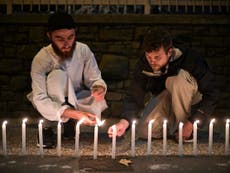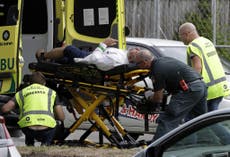My cousin died in the New Zealand attack. Will Christchurch finally change the way we view global terrorism?
Around the world, Muslims are daily targets of terrorism. Hundreds lost their lives in one single attack in Baghdad – and even governments perpetrate acts of violence against Muslim civilians
Yesterday I met my cousin – even though he was killed in cold blood, a few days ago, during the Christchurch terror attack in New Zealand.
While my cousin, Atta Elayyan, lived in Kuwait and later New Zealand, I was living in Jordan and North America. We had never crossed paths while the two of us lived. So I finally “met” him upon visiting his aunt’s house, where I learned much more about this ambitious 33-year-old whose life was cut so short.
During my visit, I heard about how kind and supportive he was to his family; how intelligent and ambitious he was as a tech entrepreneur establishing his own company; how energetic and athletic he was as a member of New Zealand’s national futsal team. His father, Mohammed Elayyan, who founded the Al Noor Mosque in Christchurch, was injured in the shooting.
I struggled to hold back my tears as I saw a video of Atta’s father speaking from his hospital bed about Islam being a religion of love and the need to love one another. Mohammed had spearheaded efforts to assist the local community during the devastating 2011 Christchurch earthquake, providing food and shelter in the mosque to many.
These past couple of days, I’ve been reading news items addressing this terror attack, including reports analysing how the media disproportionately blames terror attacks globally on Muslims. This propaganda is brainwashing many and increasing hate and distrust between people. Yet these reports fall short not only in their scope of what they cover but also what they fail to mention. The reports and news items mostly discuss individual terror attacks like the one committed in Christchurch. Yet they fail to mention several other important points.
First, Muslims have been the biggest victims of terror attacks globally. The January 2015 terror attacks in France killed 17 people. This was followed by a global outcry with dozens of world officials gathering in France and leading a massive march in Paris in protest. Yet in July 2016, a single terrorist attack killed almost 400 people, mostly Muslims, in Baghdad’s Karrada district. This barely crossed the radar of the global media; its victims dying silently because this was one terror attack among hundreds of others which targeted Muslims.
Second, many terror groups in the world today – including Isis, which has killed so many Muslims – have been named as “of Islam”. This divides east and west, giving non-Muslims the illusion that these actions are perpetrated with the implicit consent of Muslims, even when these attacks lead to the suffering of their own.
Third, and perhaps most significantly, these media reports often fail to acknowledge that violence perpetrated by western governments and their client puppet states lead to innocent civilian suffering. While observing individual terrorist attacks like those committed by white supremacists in Christchurch, we must not forget that the wars and oppression waged on places such as Iraq, Syria, Yemen, Libya, Palestine and elsewhere are also a manifestation of terror practised against civilian populations. These massacres, just like the lone wolf attack we witnessed in New Zealand, should not be given a false cloak of legitimacy just because they are the actions of governments.
Despite all of this, and despite media reporting of terror, the world’s 1.6 billion Muslims do not hate the west or those of other beliefs. This sentiment manifested itself clearly when one of the first victims to be killed at the Alnoor mosque greeted the terrorist coming to kill him with words of love, saying: “Hello brother.”
The attack has backfired on this white supremacist, and the love shown towards the Muslim community has exemplified his failure.
My cousin leaves behind his wife and a two-year-old daughter. Hopefully, if we all work together hard enough, she can grow up in a world that is better than the one we inhabit today.
Rifat Audeh is a human rights activist and filmmaker




Join our commenting forum
Join thought-provoking conversations, follow other Independent readers and see their replies